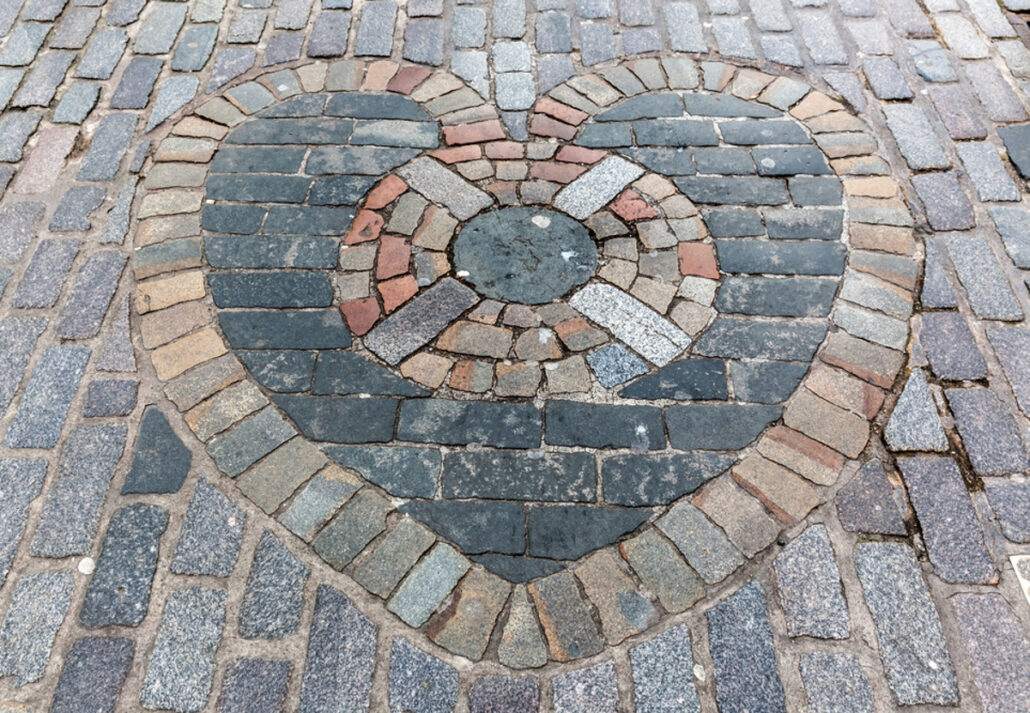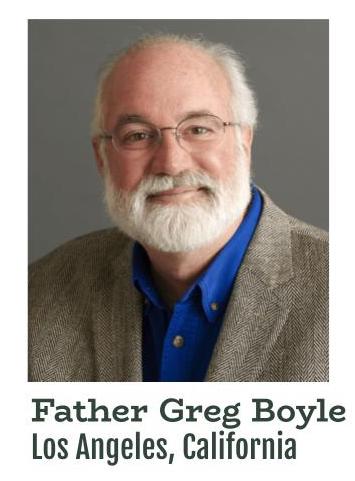See. Do. Be. Free.

Issue 019
An Open Letter to the Community around this year's theme.
Issue 019: Wholeheartedness – “Warmheartedness” by Father Greg Boyle
As Street Psalms enters its 25th year of forming grassroots leaders in vulnerable communities, we are inviting friends of our work to reflect with us on their own sense of vocation and call. This month Father Greg Boyle reflects on our guiding question:
When did your sense of vocation become real to you and what does it mean for you to show up wholeheartedly in your call when confronted with disappointment, failure, despair, and your own half-heartedness?
I was channel-surfing recently and found the Dalai Lama being interviewed. He seemed to be answering a question about the mark and measure of all “authentic religion.” He ponders the question, repeats it in his labored English, he then places both hands over his heart, pauses, and says: “Warmheartedness.” He mentions the word often in the course of his conversation. It’s a clunky word in English. Its clumsiness serves a purpose and it gets more clunky with its frequent use. “Warm…heart-ed…ness.” Each time he says it, he gently places his hand over his heart.
He explains that there are two parts to this. There is the inner peace of it all and the discovery of our true selves in loving, AND we are propelled into the world to be warmhearted there. To me, this means choosing to be the flesh and blood embodiment of compassion and loving-kindness, which is who God is. And so, you let love live through you.
The Dali Lama’s vision of warmheartedness works for me as I fully enter geezerdom. Fifty years ago, when I entered the Jesuits, I did so because they embodied and taught me two things to which I was attracted. They were hilarious and prophetic. It was only many decades later, I realized that what drew me to the Jesuits was, I believe, the mark and measure of authentic discipleship: joy and fearlessness. It made me say, “I’ll have what they’re having.”
As the beloved community of Street Psalms celebrates its 25 years of nurturing leaders and cherishing vulnerable communities into agency and a powerful, gracious presence, we all can take a moment and reflect on our origin story and the sustenance of our call.
For nearly forty years, I’ve been so privileged to walk with many thousands of gang members in Los Angeles through this tender community of Homeboy Industries. Truly, the day won’t ever come when I am nobler, have more courage, or am closer to God than these women and men who have walked through our doors. It was never my intention that somehow our humble outreach to gang members would become the largest gang intervention, rehab, and re-entry program on the planet. We just backed our way into that. Our evolution from a parish-based program to offer hope to the members of the 8 warring gangs in the housing projects was simply our community trying to offer concrete help.
I used to think, mistakenly, that my “wholeheartedness” was to come to the rescue. I thought my job was to fix and save. I’d ride my bike through the projects late into the night. “Put that Uzi down.” “You sure you wanna shoot that guy?” Then that stance of mine changed in an instant over 20 years ago.
I had driven a homie named Louie to drug rehab. He had been selling crack cocaine until he became his own best customer. Thirty days after Louie had settled into the mountaintop rehab, his younger brother, Eric, did something that gang members rarely did. He put a gun to his own head and killed himself. I called Louie to tell him. He was devastated. “I’m gonna pick you up for the funeral, but I’m going to drive you right back afterward,” I tell him. “Please do,” he says, “I like how recovery feels.”
I give Louie an abrazo when we meet and he gets in the car and says, “I had a dream last night…and you were in it.” He proceeds to tell me that he and I are in a moderately-sized room that is completely darkened. No light, no illuminated exit signs, and no light creeping from under the doors. We are silent, he tells me, but he knows I’m in the room. In the silence, I reach into my pocket and I happen to have a flashlight and I aim it steadily at the light switch on the wall. He tells me how grateful he is that I have a flashlight. Then he proceeds, tentatively, to follow the beam of light to the light switch. He arrives at it, sighs heavily, and with great trepidation, flips the switch on and the room is flooded with light. He’s sobbing at this point in the telling of the dream. “The light,” he says, “is better than the darkness.” He seems to be surprised by this truth.
That dream changed my life, in an instant, like the flipping of a switch. Suddenly, I knew that my call was not to fix, save, or rescue. I found my wholeheartedness in my “warmheartedness.” My vocation was not to “reach” gang members but to be reached by them. I was not being invited to the margins to “make a difference” (then it’s about me…and it can’t be about me). You go to the margins, not to make a difference, but to be made different by the poor and the powerless and the voiceless. You allow those whose dignity has been denied, to alter your heart and you receive with grace those whose burdens are more than they can bear.
You own a flashlight and you aim it and that has to be enough for you. I suppose this all sounds passive, but I think it is how human beings inhabit their own shared nobility and dignity. Indeed, if you go to the margins to make a difference, it’s about you. But if you go there to be made different, then it’s about us. Then it is about exquisite mutuality, the kinship of God, and the forming of a community of cherished belonging. God’s dream come true.
Then how do we receive disappointment and failure? How then do we address our despair and half-heartedness? Quite honestly, I felt these things all the time when the engine driving my ministry was success and “making a difference.” Mother Theresa told us that we “aren’t called to be successful, but to be faithful.” I came near burnout when I was concerned with success and “evidenced-based outcomes.” With this stance, you are depleted. But if you allow yourself to be reached, and to permit your heart to be altered by the demonized, easily despised, and readily left out, it is eternally replenishing and burnout is not possible. Exhaustion is, but not burnout.
On February 27, 1544, St. Ignatius of Loyola, the Founder of the Jesuits, enters, for the first time, this one word in his spiritual journal. He proceeds to use the word quite a bit for the remaining twelve years of his life. Before he dies, he goes back through this diary and circles the word. I speak Spanish but I had never heard this word before. And the word is “Acatamiento.” It comes from a somewhat archaic word, “Acatar” which means “to look at something with attention.” It gets translated as “affectionate awe.” Surely the word was born from a mystical moment between Ignatius and his God. But he didn’t settle for a mystical moment, he held out for a stance and movement. He was able to stand in awe at what the poor had to carry rather than in judgment at how they carry it. And like the Dalai Lama it was about “inner peace” but also about bringing this stance to the margins. You receive the tender glance from our God and you choose to become this tender glance in the world. For surely, only the soul that ventilates the world with tenderness has any chance to change the world.
Joseph and I are finishing a conversation in my office, and he stands to leave. I’ve known him since he was a kid. His father was a gang member and died of a heroin overdose. Joseph followed suit as a gang member but never succumbed to his own multiple overdoses. He’s doing well now and back working at Homeboy Industries. “I think life, “ he says, “is just removing the blindfold.” I agree with him, but ask, “What do you see, Joseph, when the blindfold falls?” He pauses, and gently pats his chest, “Goodness.”
We inhabit our dignity and nobility in each other’s presence and this is exquisitely mutual and eternally replenishing for everyone. Disappointment, failure, and half-heartedness do not speak this language. It doesn’t understand the powerful simplicity of “Acatamiento.” There is no despair in “affectionate awe” only tender delight and abiding admiration. You find your joy and fearlessness in walking with those who are left out. You look with attention. When this happens, everyone feels a little less invisible. Nothing passive here. We choose to cherish with every breath and find ourselves alive and thriving, flourishing in relational wholeness. “I’ll have what they’re having.”
Our call is to warmheartedness. In the utter simplicity of it, we find the joy and fearlessness to stand at the margins and discover them erased by our affectionate awe. The blindfold falls and we only see goodness. Now, gently, place your hands over your heart.
Gregory Joseph Boyle, S.J. is an American Roman Catholic priest of the Jesuit order. He is the founder and director of Homeboy Industries, the world’s largest gang-intervention and rehabilitation program.

